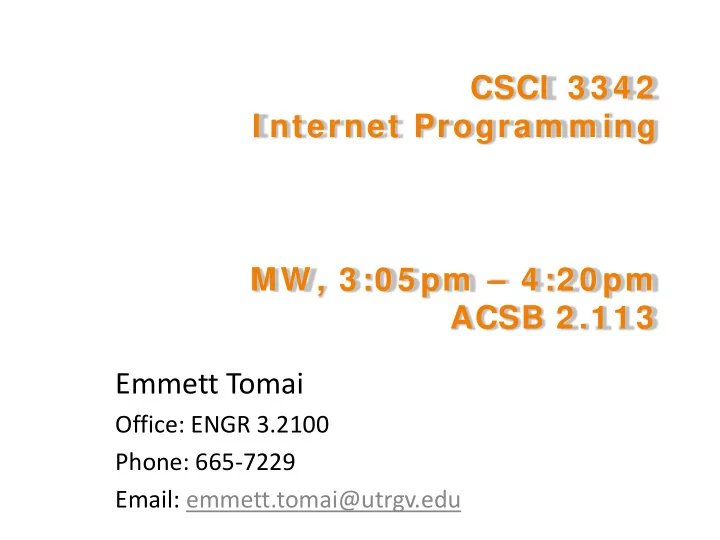

CSCI 3 3 4 2 I nternet Program m ing MW , 3 :0 5 pm – 4 :2 0 pm ACSB 2 .1 1 3 Emmett Tomai Office: ENGR 3.2100 Phone: 665-7229 Email: emmett.tomai@utrgv.edu
Course Information http://faculty.utrgv.edu/emmett.tomai/courses/3342/ • All course materials and announcements will be available on this web site – Syllabus – Instructor and TA contact information – Lecture materials – Assignments – Due dates, exam schedule, announcements • Course announcements and other updates will also be sent via email – You are expected to check your email every weekday and at least once on weekends
Web Application Programming • Web (browser-based) applications are increasingly the preferred way to provide software services – Started with simple web pages, mostly news and “brochures” – E-commerce (amazon, ebay, etc) – Intra-net corporate apps (timesheets, reporting, help requests, etc) – Community forums – Lightweight applications (email, calendar, trip planners) – “Web 2.0” community created sites (blogs, youtube, facebook, reddit, instagram, etc) – Desktop-like applications (gmail, games) – Mobile apps use similar paradigms and tech stacks
Web Browser Platform • Initial advantages – No additional installation – Accessible anywhere – Familiar interface – No distribution and update costs – Lots of momentum = customers, funding • Software as a service – Control over who gets to use it when • Combats piracy, dampens resale market – Control of the data (!!!)
Course structure • This is a practical course to teach you how to design and implement web applications – Learn the fundamental architecture of web applications • Practice with specific technologies – Learn how to keep up with the fast-changing landscape • Those technologies may be obsolete in 3 years • There will certainly be new technologies and ways to use them • You have to be able to try out, evaluate and adopt new things quickly and efficiently
Course structure • Weekly (there will be exceptions) – Tuesday lecture • Review prior assignments • Introduce new concepts • Demonstrate design, development, debugging, testing • Follow-up challenge: – Try out what we talked about – Build on it by researching an extension – Thursday lab • Show off your challenge solution • Lab activity to practice... • Leading into the weekly homework assignment – Due Tuesday, late on Thursday
Course structure • Course project – The last 2-4 weeks of the semester will be spent on a larger team project – This will involve learning and reporting on a different web technology • Midterm and f inal exam – In lab, on computers, open web – Based on the weekly assignment material – Can you build the basics on your own with a time limit?
Main Topics • Static web pages: HTML, XHTML, CSS • Dynamic web pages: JavaScript and the DOM • More dynamic: AJAX, HTML5 and JavaScript libraries • Data encoding: XML, JSON, SOAP, AMF • Clients and servers: TCP/IP, sockets, HTTP • Server-side scripting: PHP, J2EE, node.js • Session management • Security and encryption • Databases and SQL • Multi-tier apps: MVC • Web application frameworks
Textbook • This course does not use a traditional textbook. Web programming is a fast-moving field, and the most current resources are online. We will be relying on those in class. – A significant skill in web application development is the ability to learn new technologies • Many books, fragmented and quickly outdated • Excellent, up-to-date resources are available online – In this class, you will be required to find resources and learn from them as part of your assignments
Course requirements • Students are expected to attend – You are responsible for everything discussed in class – No make-ups for in-lab/class exercises • Weekly assignments – Challenge due at the beginning of lab (Thu) – Lab due at the end of lab (Thu) – Assignment due at the beginning of class on Tue • Assignment late at the beginning of class on Thu – If you are having trouble, come see me before the due date
Scoring and Grading • Scoring: In-class/lab exercises 10% Assignments & Project 55% Midterm and final 35% ---------- Total possible score (max): 100% • Final grade: 90-100% A 80-89% B 70-79% C 60-69% D 0-59% F
Office Hours • Any time by appointment, email one day in advance • Scheduled drop-in times on website – Open drop in, first-come first-served • Any time, I’m usually around, but may not be available
Teamwork and Academic Honesty • Students are encouraged to assist one another, but each student must still do their own work • Giving and receiving major sections of code is considered cheating and will be dealt with on an individual basis (beginning with total loss of points followed by formal disciplinary action) • All students should be familiar with University policies on academic dishonesty • Some assignments may allow team work – Partners are there to learn teamwork and motivate each other – Your partner is not there to carry you or teach you – You are responsible for the assignment, regardless of how helpful or not your partner is
Student Accessibility Services • Services such as note takers, extended test time or separate accommodations for testing are available • Contact Student Accessibility Services (SAS): – http://www.utrgv.edu/accessibility/ – University Center 108, 956-665-7005 • Verification of qualification for services determined by SAS – Completely confidential – Student is responsible to inform instructor of verified services • Contact information also available on the syllabus
Questions? • All course details and policies, as well as a complete (tentative) schedule are in the course syllabus, available on the web site
Recommend
More recommend